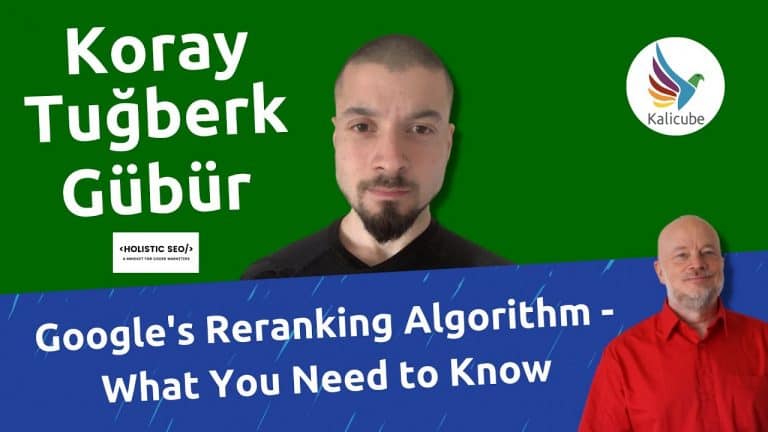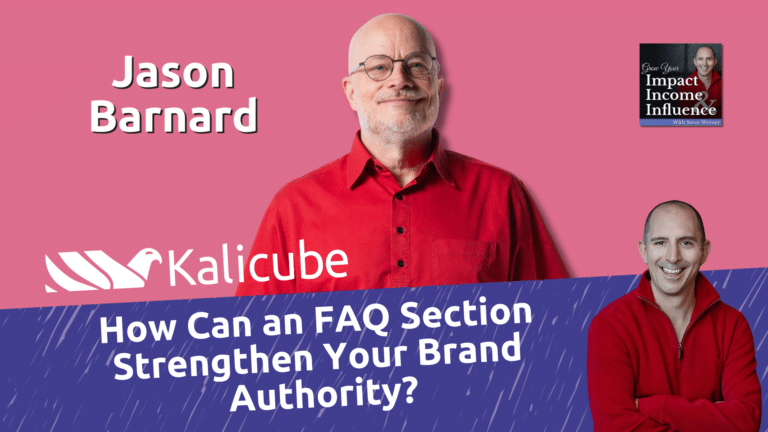The Ultimate Online Investment: Maintaining Your Knowledge Panel for Long-Term Success
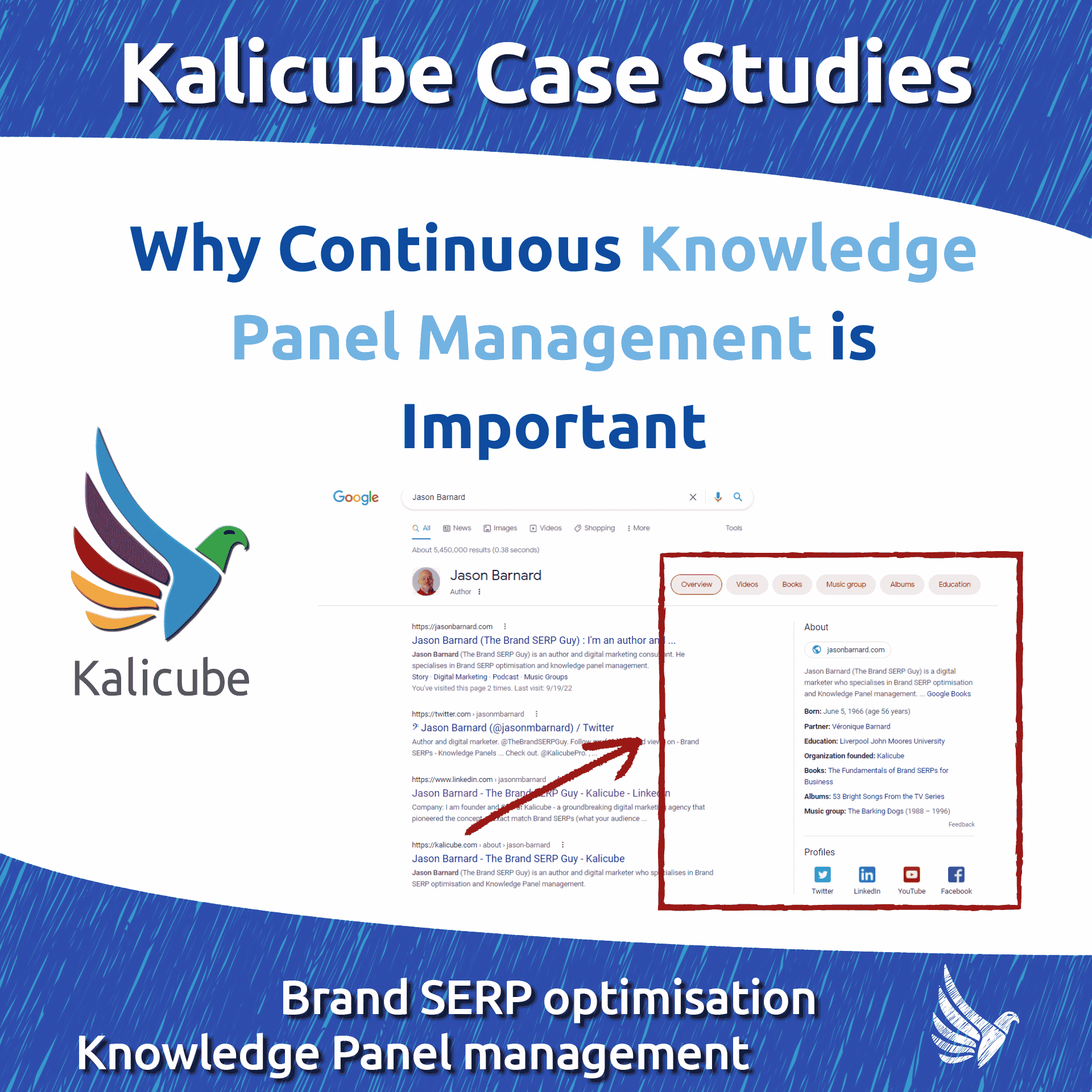
How managing your Knowledge Panel will help you control what you show on Google and remove the need for a digital marketing strategy.
I am now 100% confident that people will see what I want to show (not what Google wants to show) when I tell them to Google my name!
Jason Barnard, CEO of Kalicube
Most people think that once you’ve triggered a Knowledge Panel that everything magically falls into place without any further effort on your part. In reality, there’s no such magic spell, and if you neglect your Knowledge Panel because you think you’ve won the game, then you should definitely read this article.
Three Reasons Why Continuous Knowledge Panel Management is Important:
The three reasons why it is incredibly important and vital to continuously work on Knowledge Panels.
- It Takes Several Years for Google to Build Confidence Around Your Entity,
- Google’s algorithms (and features) are constantly evolving, and major updates occur multiple times every year,
- The Online Information About Your Entity Changes Over time.
1 – It Takes Several Years for Google to Build Confidence Around Your Entity
For a Knowledge Panel to become a stable and permanent fixture on your Brand SERP, Google needs to be SUPER confident in the veracity of the information. Building up that confidence is necessarily a long-term project.
It also needs to understand which information is helpful to your audience. So in the early stages of your Knowledge Panel, Google will A/B test.
If you have noticed that the attributes and information in your Knowledge Panel keep changing, this means that Google is still A/B testing and building confidence in its understanding of your Entity.
An A/B test is a randomised experiment with two or more variants of Knowledge Panel (A and B). Variant A is the original and variants B to n each contain at least one element that has been changed from the original.
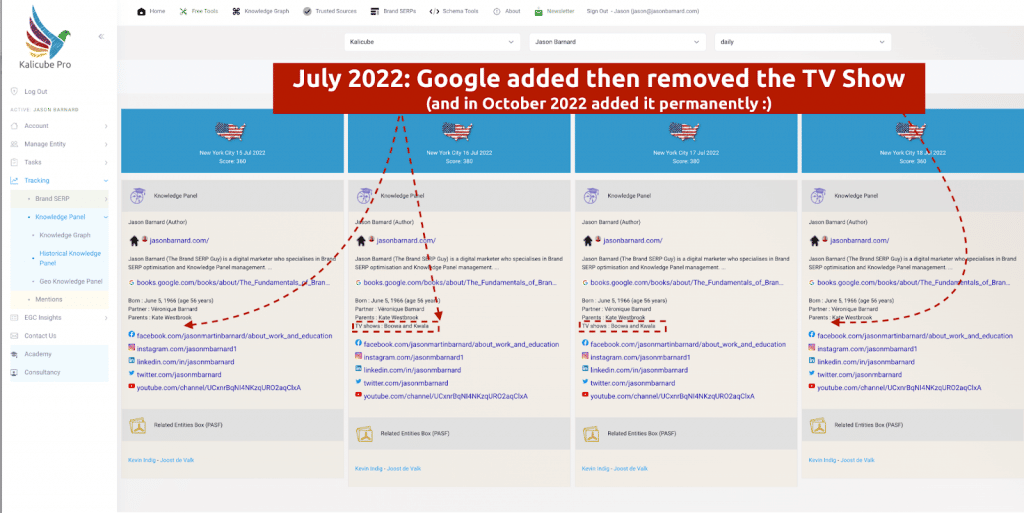
Once Google is done with the A/B test and has identified and collected what it thinks are facts about your Entity, you can see how the information builds up and stabilises in your Knowledge Panel, starting with the Entity Description and the photos.
Frequent A/B tests are normal in the first year. After that, the Knowledge Panel will stabilise if Google is super confident in the information: if it continues to A/B test frequently after the first year, then you need to work to build more confidence.
Importantly, even with a stable Knowledge Panel, occasional A/B testing will always be something you’ll see.
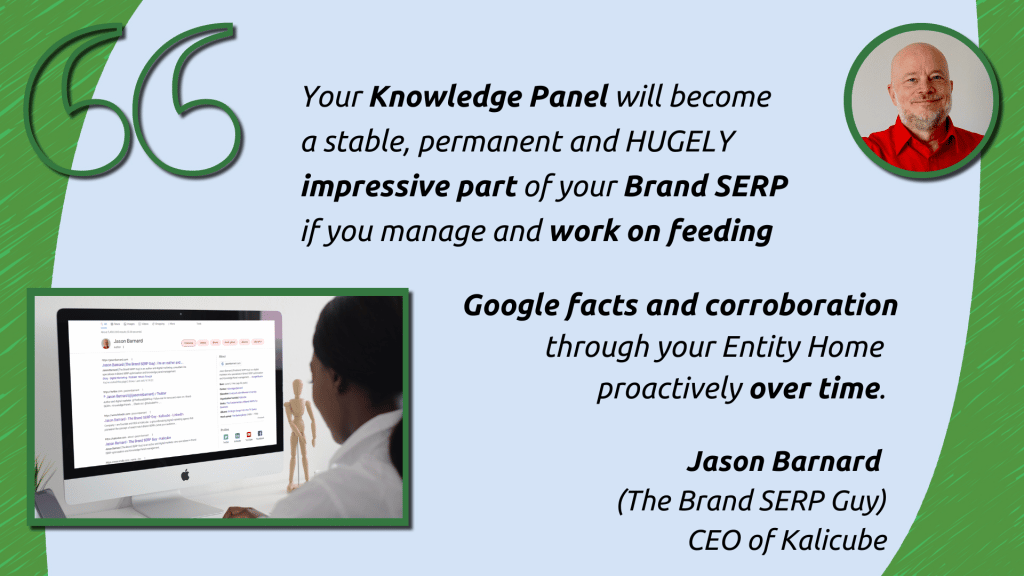
Your Knowledge Panel will become a stable, permanent and HUGELY impressive part of your Brand SERP if you manage and work on feeding Google facts and corroboration through your Entity Home proactively over time.
Jason Barnard (The Brand SERP Guy®), CEO of Kalicube
Kalicube Pro™ tracks fresh mentions and results about your Entity from around the web on a weekly basis so you can proactively maintain consistency of the information about your entity across the web. This helps build Google’s confidence in the information it has understood about the Entity and also, through the Kalicube Schema snippet, cements the Entity Home as the authoritative source. Once the A/B testing is complete, Google will no longer have any hesitation and will display the information you have educated it with because you have built that trust: Google sees you as a highly reliable and authoritative source of truth. Even a machine like Google needs reassurance 🙂
Read about educating Google the Child here >>
2 – Google’s Algorithms are Constantly Evolving, and Major Updates Occur Multiple Times Every Year
Google has three Knowledge Algorithms. Each is driven by Machine Learning, and so is constantly evolving (ie, daily). Google engineers also periodically update each one manually. That means you need to keep a constant and consistent eye on your Knowledge Panel (if you have one) and if you don’t yet have one, you are chasing a constantly moving target to get one.
Small changes happen all the time. Your Knowledge Panel could trigger any day without warning. You need to be ready to nurture it. Information in your Knowledge Panel could change tomorrow. You need to know so that you can correct it if it is wrong, or expand upon it to enhance your Knowledge Panel further.
You can see here just how much information in a Knowledge Panel can change in just over a year. Multiple items added, some removed, some changed plus some feature changes (see below).
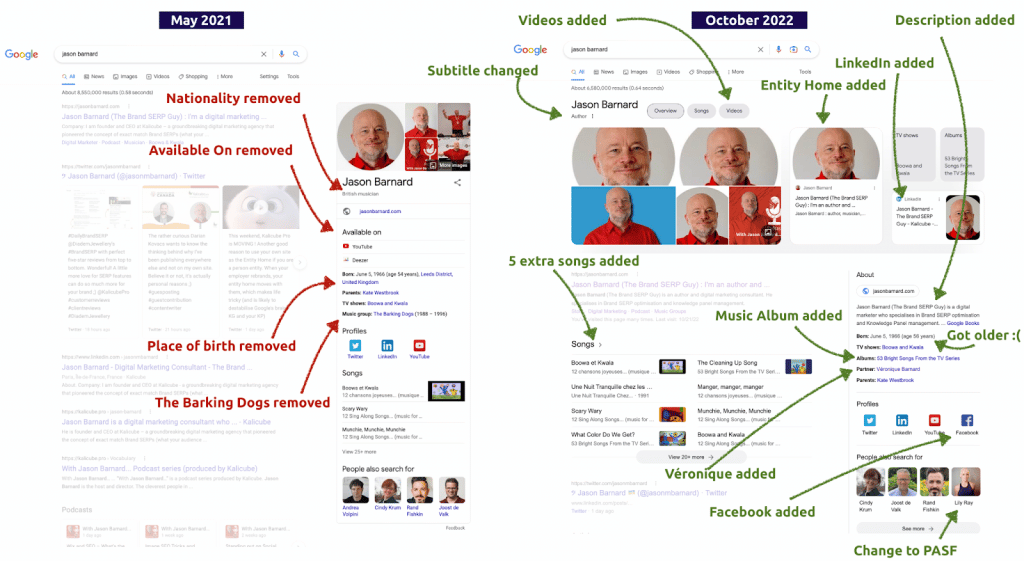
Losing a Knowledge Panel
The worst case scenario is that the Knowledge Panel disappears or is deleted by a human at Google (yes, that happens), or an update to the knowledge algorithms. This generally happens when a Knowledge Panel is classified as Spam (yes, Knowledge Panel Spam is a thing), because the algorithms see information changing and cannot validate their veracity, or because the algorithms have lost confidence in the information.
Google adds new features – you need to be ready
Once you have a stable Knowledge Panel that appears consistently, the new features Google regularly adds to Knowledge Panels become both a potential issue (when Google gets it wrong) and a huge opportunity to gain a HUGE “Google stamp of approval” when your audience searches your brand or personal name..
Look at the change to the features in this Knowledge Panel in just a year.
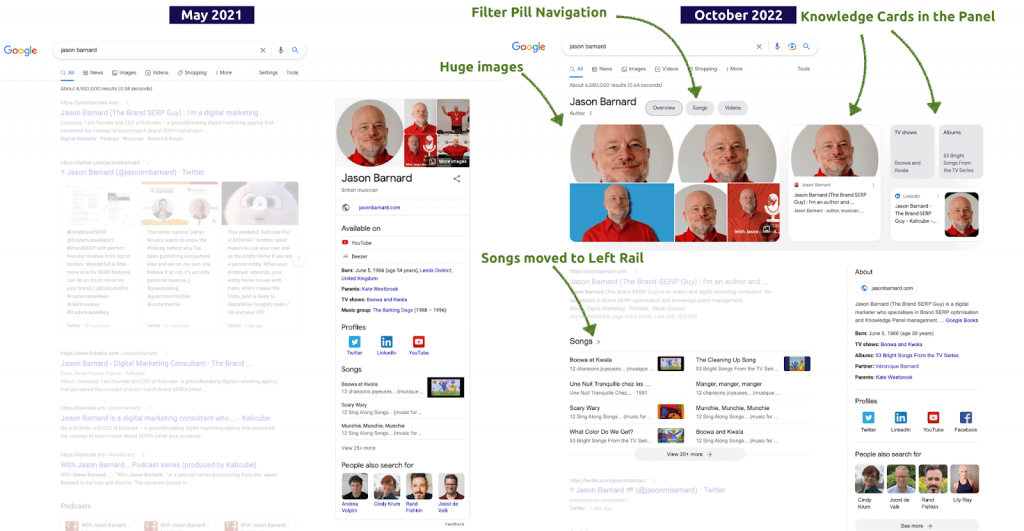
Consider this image – the real estate taken up by a full featured Knowledge Panel is phenomenal: there is very little else above the fold.
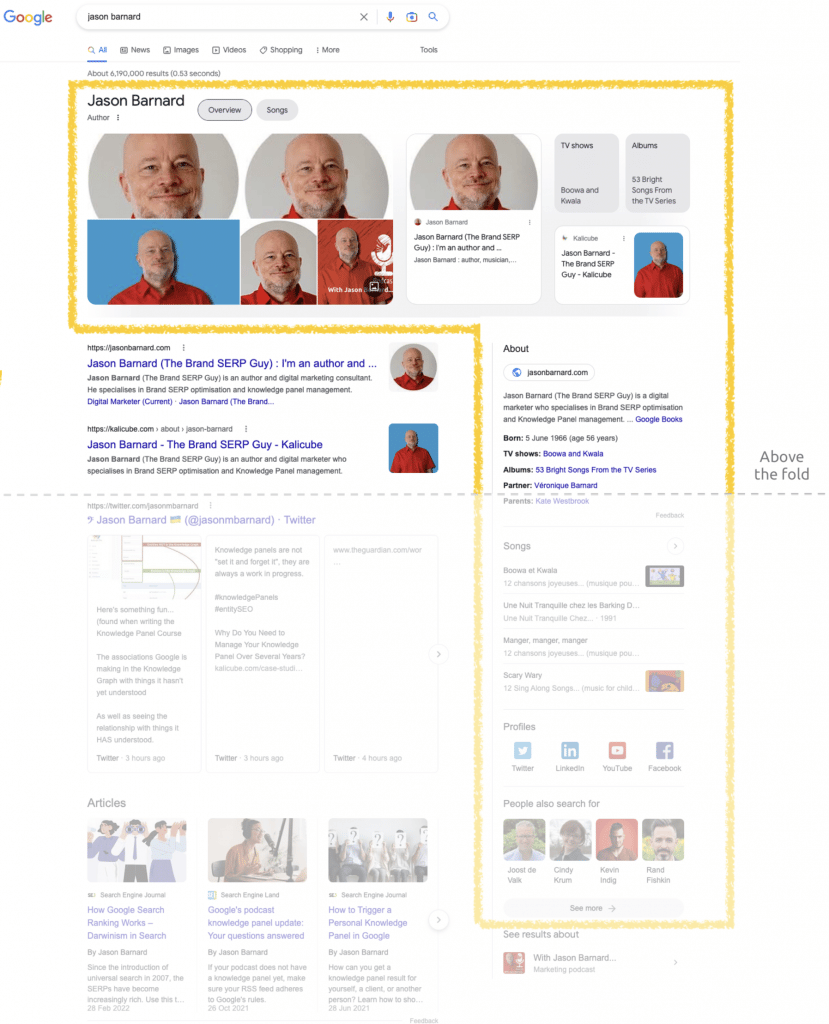
Why did I get such a full-featured Knowledge Panel with relevant, helpful information? Because I have been tracking, and enhancing it over time (in this case, 2 and a half years since this Wikipedia disaster).
New features and information enhancement are both super important. So is not losing the Knowledge Panel!
You probably think “the information is out there and it is all very obvious, Google can keep itself up to date and join the dots”. Huge mistake. Google does have the information, and can often join the dots, but the information online is constantly updating, and the dots shift and the relationships evolve. Google can easily get confused or lost or misunderstand. That means you really have to help Google over time by maintaining up-to-date information on the Entity Home:
- a presentation of all the facts (update regularly),
- a clear representation of the relevant dot-joining relationships (which evolve, so update regularly),
- a list of the relevant authoritative, and trustworthy corroborative sources Google is looking at (both which sources Google uses and the contents of the pages change over time, so update regularly).
Note: Kalicube Pro™ (our SaaS platform) makes Entity Home Maintenance simple, effective and efficient.
The Kalicube Process™ evolves with Google and each Knowledge Algorithm update is like a gift we are happy and eager to unwrap. We aren’t afraid of the Knowledge Algorithm updates, on the contrary, we look forward to them, whether they are positive or negative.
Here you can see the “gradual” improvement of my Knowledge Panel over time (the measurement scoring is a Kalicube Pro metric). The visualisation shows clearly when different elements were added month by month. This also shows that enhancing a Knowledge Panel with additional information is a slow and steady process.
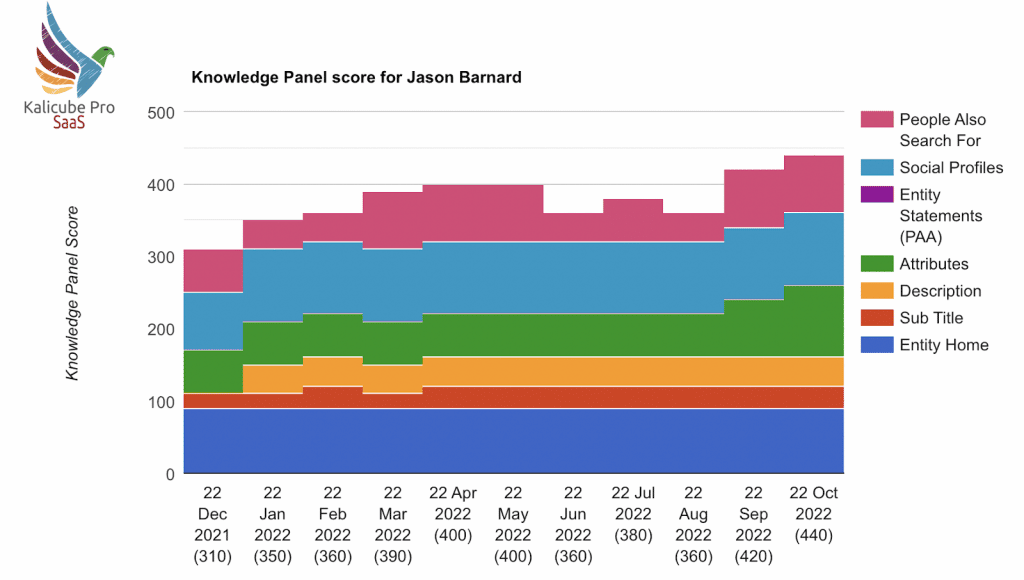
We even have multiple tracking mechanisms in place, including our Knowledge Graph Sensor so that we can be immediately informed of any updates. Plus we understand how the Knowledge Algorithms work.
3 – The Online Information About Your Entity Changes Over time
Information about any Entity on the Internet changes over time, including additions and removals, new social profiles, breaking news, et cetera. Since Google is constantly crawling the web, it finds all these changes, so failure to keep a close eye on these changes will be detrimental to both the Knowledge Graph presence and the Knowledge Panel.
This happened with my previous band, The Barking Dogs, where Deezer added one of their albums to another group of the same name. This confused Google, and the album disappeared from their Knowledge Panel. Kalicube Pro’s tracking flagged the issue for me, and I asked Deezer to make changes, and a staff member manually implemented my suggestions. The album reappeared in the Knowledge Panel.
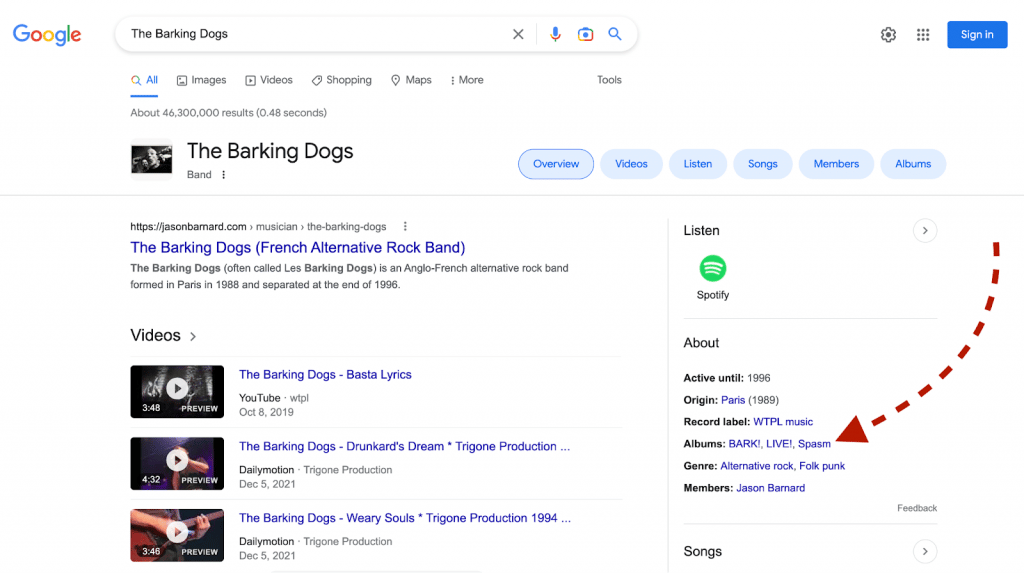
On another occasion, someone started a Fandom page about Boowa and Kwala stating that they are from Australia. Although it was just one sentence in one page, this confused Google. I edited the page to provide the “real” answer: The Land in the Middle (boowa and Kwala’s name for Mauritius).
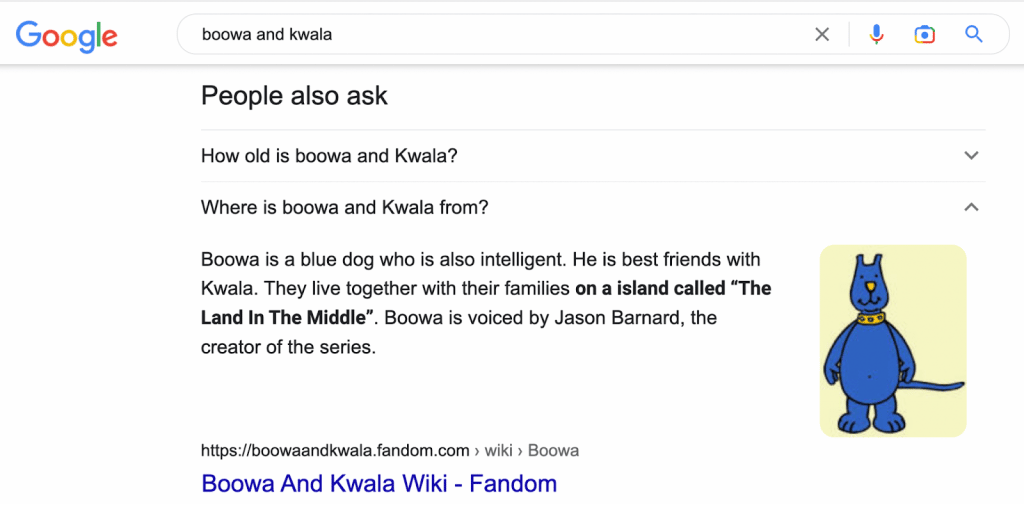
So if you do not proactively correct, and update information on all sources Google uses for its Knowledge Algorithms, you’ll get caught out one day. Google will get something wrong, and it will take you weeks or months to correct.
Retaining your authority in Google’s mind and thus keeping control with ongoing Entity Home Maintenance is essential here too: if Google ends up thinking that a second or third party source says about your Entity is more accurate than information it is getting from the entity itself, it might just move the Entity Home to another source that it considers authoritative. That would take months, or perhaps years to get back.
Kalicube Pro’s daily, weekly and monthly tracker for Brand SERPs and Knowledge Panels gives you the insights you need to keep track of Google’s updates and changes in its implicit and explicit understanding of the facts about the Entity. That ensures you can proactively find and fix issues before they become a problem, and also repair any mistakes simply, efficiently and effectively 🙂
Additional Scenario: Internal Website Bots Creating Inaccurate Information
Another scenario that can trigger issues with a Knowledge Panel at any time without warning is changes made by bots and algorithms of sources Google is using for knowledge. That could be Amazon, Crunchbase, Wikipedia, Wikidata, Zoominfo, or any one of thousands more.
Here’s another example using The Barking Dogs and a Wikidata Bot. Soweego Bot algorithmically added inaccurate claims on the Wikidata page of The Barking Dogs. Unfortunately, the Facebook page and Discogs reference were for a DIFFERENT group with the same name. Now Google has moved their Entity Home to my site (so I now control BOTH “The Barking Dogs” Entities). I am trying to move it away again, since I don’t want to control their Entity.
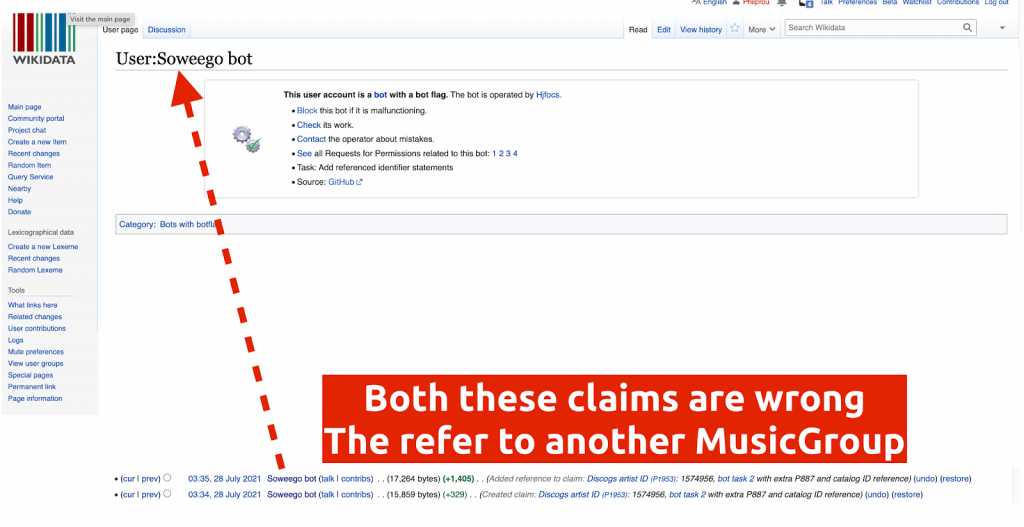
On many information sources Google uses for knowledge, internal Bots automatically update information and sometimes that information is inaccurate. They are often the culprits for creating mix-ups in Google’s mind: Google trusts the source, but (ironically) doesn’t know that the internal bot algorithm has made a mistake.
How Long Do You Actually Need to Manage Your Knowledge Panel?
A year or two is enough to create a stable and dominant Knowledge Panel, but the reason my Knowledge Panel is as rich as it is today is that I have been proactively managing it and keeping everything up to date for over 10 years already 🙂
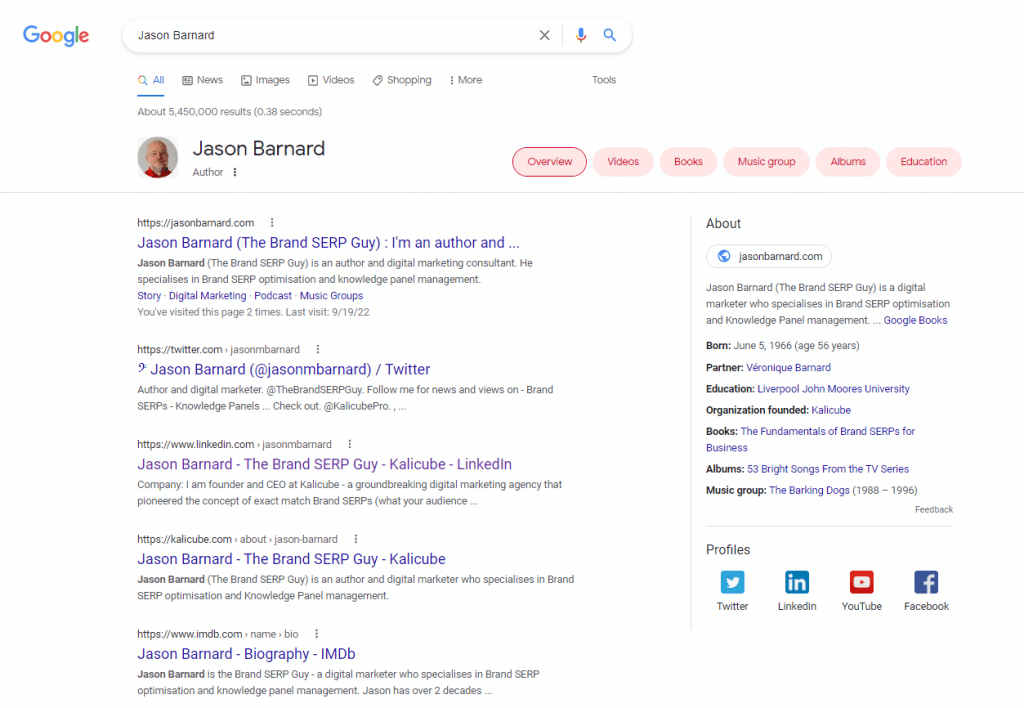
Ensure your Knowledge Panel stays accurate and up-to-date. Book a call with Jason Barnard to get started.

